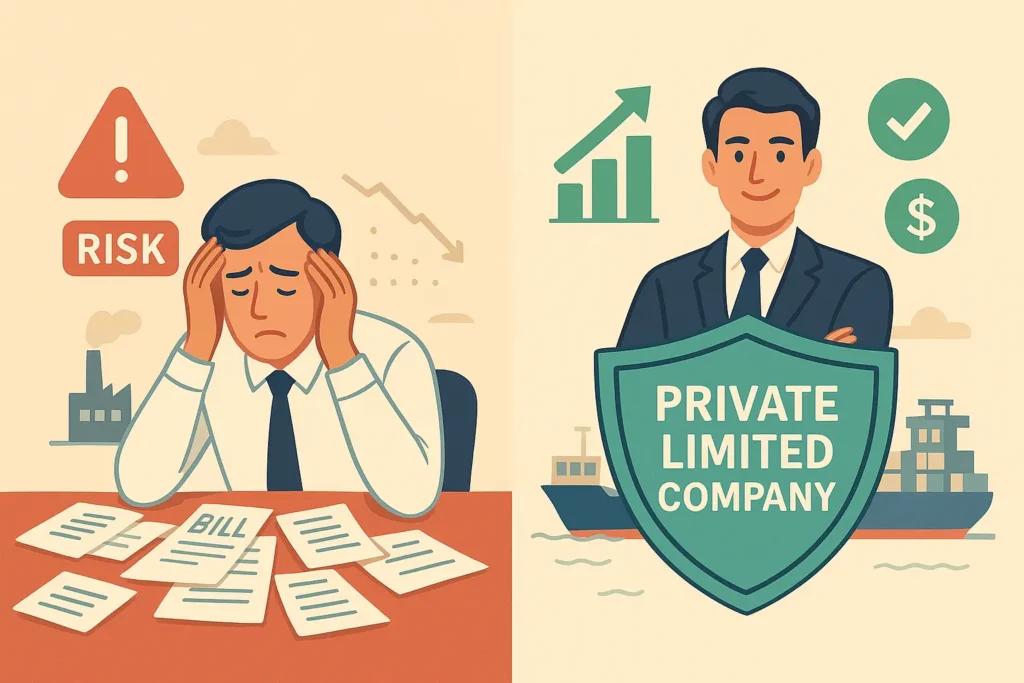When you’re starting small, you want the simplest way to get your business off the ground. That’s why so many Indian entrepreneurs, including me, start with a sole proprietorship business. It’s easy, affordable, and quick to set up.
I’ve been running my MSME as a sole proprietor for years—even handling exports in this structure. Honestly, it’s been the perfect launchpad. But as my ambitions grow, I’m hitting the limits of what a sole proprietorship can do, especially when it comes to liability and expansion.
That’s where the private limited company comes into the picture.
You may also like to read:GEM Portal: My Experience, Registration Process, special benefits for msme, startup and woman entrepreneurs
What Exactly Is a Sole Proprietorship Business?
A sole proprietorship business is the simplest form of business ownership. You are the business. No partners, no shareholders, no separate legal entity.
- Easy setup (GST, Udyam registration).
- Low compliance.
- All profits and losses are yours.
Sounds great, right? It is—until you hit the biggest disadvantage: unlimited liability.
Unlimited Liability: The Hidden Risk of Sole Proprietorship
In a sole proprietorship, your personal assets and your business assets are the same in the eyes of the law.
That means:
- If your business owes money, you owe money personally.
- If a client sues you, your savings, home, or car could be at risk.
👉 Example: Imagine you run a small trading business and ship goods worth ₹10 lakhs. Your buyer defaults, but you already borrowed to pay your supplier. As a sole proprietor, the supplier can legally come after your personal assets to recover the dues.
This unlimited liability is the single biggest weakness of a sole proprietorship. It works when risks are low, but once your operations grow, so do the stakes.
Limited Liability: The Superpower of a Private Limited Company
A private limited company is a separate legal entity. The company owns the business, not you personally.
- Your liability is limited only to the amount you invest.
- Creditors cannot touch your personal property.
- The company can survive beyond you—it has perpetual existence.
👉 Example: Let’s say your private limited company borrows ₹10 lakhs and runs into losses. You, as a shareholder, only lose what you invested (say ₹1 lakh). Your house, bank deposits, or car remain safe.
This safety net is why investors, banks, and even large clients prefer dealing with private limited companies.
Sole Proprietorship vs Partnership vs LLP vs Private Limited
Here’s how they stack up:
| Feature | Sole Proprietorship | Partnership | LLP | Private Limited Company |
|---|---|---|---|---|
| Setup | Very Easy | Easy | Moderate | More Complex |
| Compliance | Minimal | Moderate | Higher | High |
| Liability | Unlimited (personal risk) | Unlimited | Limited | Limited |
| Funding | Limited | Limited | Better | Best |
| Scalability | Low | Moderate | High | Very High |
| Investor Appeal | Low | Low | Medium | High |
My MSME Journey: From Sole Proprietor to Thinking Bigger
Starting as a sole proprietor was the best choice for me. I could register quickly, focus on building customers, and even manage exports with the right registrations like IEC.
But now, as I aim for larger orders, more funding, and possibly investor partnerships, the unlimited liability risk feels too heavy. A private limited company offers not only credibility but also the safety of limited liability.
That peace of mind alone makes the transition worth considering.
Key Takeaway
- If you’re a first-time entrepreneur or MSME, a sole proprietorship business is the easiest way to start.
- But remember: unlimited liability means your personal assets are always at risk.
- For serious scaling, funding, and growth, a private limited company is the safest and smartest option.
Think of it this way: sole proprietorship gets you off the runway, but private limited gives you the wings to fly higher—without burning your savings if things go wrong.





